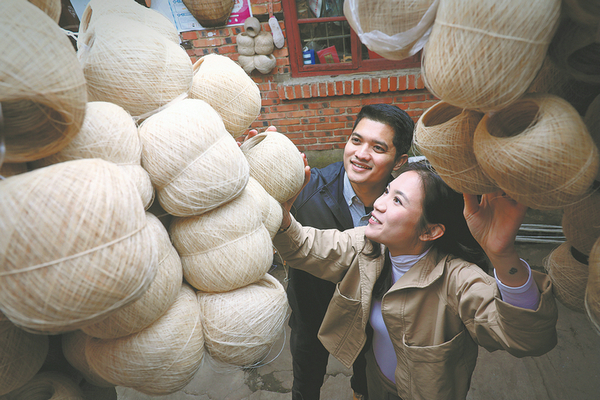Indian-Chinese couple brings ancient craft to the global stage


Rongchang xiabu craftsmanship — a Chinese traditional intangible cultural heritage — is getting more attention and market opportunities worldwide owing to the inheritance and innovation by Ivan Andrew Chen, a young man from India, and his Chinese wife, Tang Yi.
Rongchang xiabu, a type of xiabu (literally "cloth for summer"), or Chinese linen, is an ancient handmade textile that originated in the Han Dynasty (206 BC-AD 220) in Rongchang district, Chongqing.
Rongchang, Tang's hometown, is a historical city that claims three national cultural intangible heritages — Rongchang xiabu, Rongchang pottery and Rongchang paper fan-making techniques. It is also an ideal cultivation base for high-quality ramie, or China grass, from which the renowned xiabu cloth comes.
Hailed as the "king of natural fibers", the textile is comfortable, easy to wash, durable, and gives off a silky luster, making it ideal summerwear.
Xiabu from Rongchang was once immensely popular. It became a favorite fashion choice for royals and nobles during the Tang Dynasty (618-907) and was one of the earliest exported products from the area in the 20th century, with an annual output of around 700,000 bolts.
Born in Mumbai, India, in 1989, Chen has deep roots in China — his grandfather is a Chinese Indian from Guangdong province, and he has a quarter Chinese heritage. He worked as a service coach with an international airline in Qatar for six years.
Chen reconnected with China in 2015 when he met Tang at a friend's party.
Tang, 32, was born into a family that has concentrated in the xiabu industry in Rongchang for three generations. In 2022, her cousin Ma Linqin was honored as a municipal-level inheritor of Rongchang xiabu craftsmanship in Chongqing.
Shortly after completing a college business degree in the United Kingdom, Tang returned home with a vision to help her family's businesses at Chongqing Rongchang Denan Linen Textile Co, one of the local pillar xiabu companies.
In recent years, the cousins have incorporated elements appealing to younger tastes into the ancient art and have promoted hundreds of creative items made from their xiabu fabric, such as screens, decorative paintings, embroideries, folding fans, notebooks, bedding and towels.




































